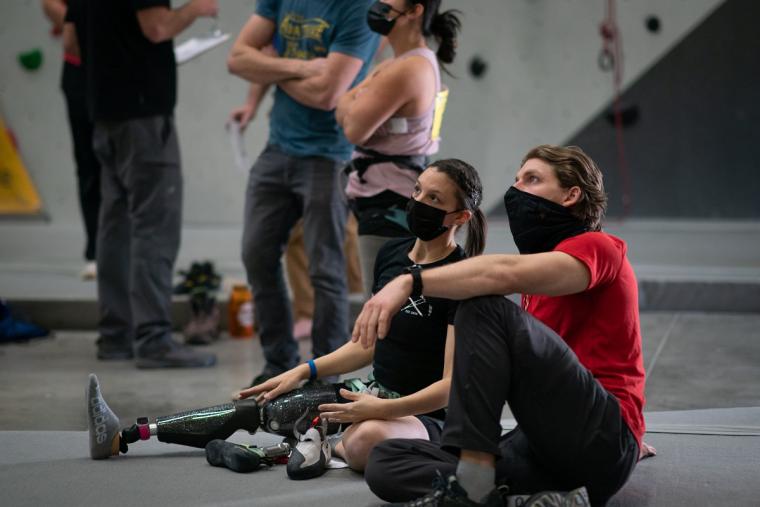
Photos courtesy of Bree Robles
The combined 2023 USA Climbing National Team Trails and Paraclimbing National Championship — slated for the Mesa Rim climbing facility in Austin, Texas, from Feb. 28-March 5 — will be the first of its kind in the United States.
The National Team Trials will be the final selection event for the Elite series, while the Paraclimbing Nationals is the sole selection event for the Paraclimbing series. By the conclusion of both events, top athletes will be designated to represent the United States at international World Cup and Paraclimbing World Cup events sanctioned by the International Federation of Sport Climbing (IFSC). The 2023 Paraclimbing National Championships will kick off immediately following the National Team Trial, and the top three U.S. male and female athletes in each category will go on to represent the U.S. as a part of the Paraclimbing National Team.
The dual event acknowledges the rapid rise of paraclimbing in the United States. In May, Salt Lake City will host the IFSC Paraclimbing World Cup at The Front Climbing Gym. Other major paraclimbing events around the world in 2023 include the IFSC Paraclimbing World Cup in Innsbruck, Australia, in June (preceded a week earlier by a Masters event in Australia) and the IFSC Paraclimbing World Championships in Bern, Switzerland, in August.
Adaptive climbing relies on the existing abilities of a person so they can participate in the sport. As noted by Adaptive Athlete, a community created by adaptive athletes for adaptive athletes, “amputees who are first getting into the sport can utilize their everyday prosthesis, or climb without their prosthesis, simply choosing to wear a sleeve or other protector on their residual limb. For those that want to take up the sport more seriously, specialized feet and climbing knees exist to give the climber a more high-quality experience. Upper limb amputees can take advantage of specialized hand grips that make it easier to stay in the holds.”
Additionally, variations on harness systems provide opportunities for athletes with spinal cord injuries or loss of trunk stability. “It is possible to utilize a standard harness in conjunction with a chest harness,” according to the site. “This allows the climber to remain in an upright posture while climbing. Seated harness systems are also available, with bigger waist belts and leg loops to help prevent pressure sores. Those with paralysis, often find an ascending device helpful. The device works through a top-roped pulley system and allows the climber to gradually ascend to the top of the rock wall with the help of a ratchet-like locking mechanism.”
The IFSC has been hosting paraclimbing competitions since 2006, with the first one heled in Ekaterinburg, Russia, according to the IFSC website. Now, IFSC IFSC Paraclimbing World Championships are held in conjunction with the IFSC Climbing World Championships — “promoting athletes with a disability on the same stage as other athletes,” the IFSC states.
 In 2017, the International Paralympic Committee granted the IFSC the status of “Recogni[z]ed International Federation,” and in 2019, a “Paraclimbing Development Plan” was approved by the IFSC General Assembly. The plan’s objective is to acknowledge the strength and importance of the paraclimbing community while giving credibility to the paraclimbing movement and making the sport worthy of consideration of future Paralympic Games.
In 2017, the International Paralympic Committee granted the IFSC the status of “Recogni[z]ed International Federation,” and in 2019, a “Paraclimbing Development Plan” was approved by the IFSC General Assembly. The plan’s objective is to acknowledge the strength and importance of the paraclimbing community while giving credibility to the paraclimbing movement and making the sport worthy of consideration of future Paralympic Games.
The first Adaptive Climber Festival was held at Horse Pens 40 near Steele, Ala., according to Outside magazine’s “A Brief History of Adaptive Climbing,” and Adaptive Nights at local climbing gyms have become popular around the country. One of those facilities is Boulders Climbing Gym in Madison, Wis., where monthly adaptive climbing nights have gained traction thanks to TikTok, and workshops are held on the last Sunday of every month led by employees and volunteers.
As detailed in Isthmus, the city’s alternative newspaper, Boulders’ adaptive climbing program began in 2014 with a grant from the University of Wisconsin-Madison. “At the end of the year, Boulders partnered with Adaptive Adventures, a nonprofit that provides accessible outdoor sports opportunities, so the gym could continue its adaptive climbing program,” according to the paper. “Certain climbing routes and walls at the gym are reserved for adaptive climbers. Volunteers belay them, or manage the rope, and provide whatever accommodation is needed. Those accommodations range from verbal cues to direct side-climbing support to gear, such as a special harness or the ARC Harness, which provides people with more severe physical disabilities the means to climb. Each climber is different, and so the modifications vary depending on who’s on the wall.”
“It just makes sense,” Talon Edseth-Griffin, a Boulders employee, told the paper. “Just because they have a disability doesn’t mean they shouldn’t get to do things like [climbing].”

